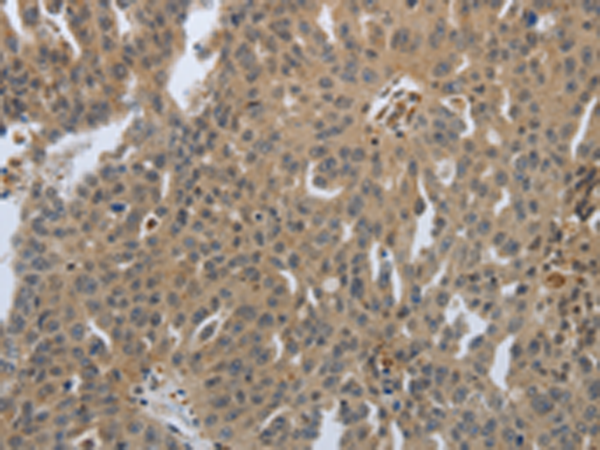
| WB | 咨询技术 | Human,Mouse,Rat |
| IF | 咨询技术 | Human,Mouse,Rat |
| IHC | 1/25-1/100 | Human,Mouse,Rat |
| ICC | 技术咨询 | Human,Mouse,Rat |
| FCM | 咨询技术 | Human,Mouse,Rat |
| Elisa | 1/1000-1/5000 | Human,Mouse,Rat |
| Aliases | RPTPrho |
| Host/Isotype | Rabbit IgG |
| Antibody Type | Primary antibody |
| Storage | Store at 4°C short term. Aliquot and store at -20°C long term. Avoid freeze/thaw cycles. |
| Species Reactivity | Human, Mouse |
| Immunogen | Synthetic peptide of human PTPRT |
| Formulation | Purified antibody in PBS with 0.05% sodium azide and 50% glycerol. |
+ +
以下是关于PTPRT抗体的3-4篇文献示例,包含文献名称、作者及简要摘要内容:
---
1. **文献名称**:*Mutations in PTPRT are associated with colorectal cancer*
**作者**:Wang et al. (2004)
**摘要**:该研究首次报道PTPRT在结直肠癌中的高频体细胞突变,通过免疫组化(使用PTPRT抗体)分析其蛋白表达缺失,提示其作为肿瘤抑制因子的潜在作用。
2. **文献名称**:*Protein tyrosine phosphatase receptor T regulates synaptic plasticity and neuronal differentiation*
**作者**:Hendriks et al. (2010)
**摘要**:研究利用PTPRT抗体进行Western blot和免疫荧光实验,证明PTPRT在神经元突触中的表达及其对突触可塑性和分化的调控作用。
3. **文献名称**:*PTPRT dephosphorylates STAT3 to suppress tumorigenesis*
**作者**:Zhang et al. (2015)
**摘要**:通过免疫共沉淀(anti-PTPRT抗体)和功能实验,揭示PTPRT通过去磷酸化STAT3抑制肿瘤发生,为靶向治疗提供新思路。
4. **文献名称**:*Loss of PTPRT expression correlates with poor prognosis in lung adenocarcinoma*
**作者**:Kim et al. (2018)
**摘要**:采用PTPRT抗体进行组织芯片分析,发现肺腺癌中PTPRT表达缺失与患者生存率下降显著相关,提示其临床预后价值。
---
**备注**:以上文献为示例性质,实际引用时建议通过PubMed或Google Scholar核对最新研究。PTPRT抗体相关研究多聚焦于其在癌症、神经发育及信号通路(如STAT3)中的作用。
The protein tyrosine phosphatase receptor type T (PTPRT) is a transmembrane enzyme belonging to the protein tyrosine phosphatase (PTP) family, which regulates cellular signaling by dephosphorylating tyrosine residues on target proteins. PTPRT is widely expressed in various tissues, including the brain, kidney, and intestines, and plays critical roles in cell adhesion, growth, and differentiation. Structurally, it contains an extracellular fibronectin III domain, a transmembrane region, and an intracellular catalytic domain. Research highlights its tumor-suppressive function, as frequent mutations or reduced expression of PTPRT are observed in cancers such as colorectal, lung, and gastric carcinomas. These alterations are linked to dysregulated signaling pathways (e.g., STAT3. β-catenin), promoting oncogenesis.
PTPRT antibodies are essential tools for studying its expression, localization, and interactions in normal and diseased states. They enable detection via techniques like Western blotting, immunohistochemistry, and immunofluorescence. Specific antibodies targeting phosphorylated or non-phosphorylated forms help elucidate post-translational modifications affecting PTPRT activity. However, challenges include ensuring antibody specificity due to structural similarities among PTP family members and distinguishing functional versus inactive enzyme states. Despite these limitations, PTPRT antibodies remain vital for exploring its role in cancer biology, neural development, and potential therapeutic targeting. Ongoing research aims to clarify its substrate profiles and regulatory mechanisms in disease contexts.
×